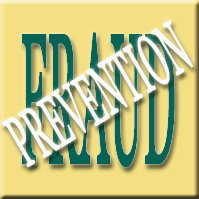
• Home •
Victim´s Story •
Fraud Prevention •
Project GSO •
Hall of Shame •
LINKS •

Prevention IX: Useful Tips to Credit Card Protection Against Fraud
Practical Tips to Protect Yourself
Against Credit Card Frauds
Despite the huge amount of work done to enhance the security of credit cards, the frauders do not waste their time and learn new tricks to by pass them. Before there comes something like an ideal chip format or 100% fraud clear card, you need to stay alert and take precautions.
Are you using these credit card protection tips?
1. Do not sign your credit card.
At least do not hurry up to do that. In the cases when credit card is stolen, the copy of your signature gets into the hands of criminals. Instead you can write in the signature area something like “Ask Photo ID” - in this case the clerk should ask to show a valid drivers license or other valid ID with photo to match the card owner.
2. Careful with sending fax copies.
Or if it is really necessary, double and triple check the number where you are sending it. This method can also be used by the card frauders.
3. Shred, shred, shred.
Very carefully shred old credit card statements. They have valuable info and you don’t imagine what talents the card frauders sometimes have to restore the most puzzling lines.
4. Card info online.
Never use auto submit features for your card (usually you can choose an option saying something like “Never save on the entire server”), because it’s not difficult to hack the automatically submitted info, and if that was your credit card info - you are in danger. So it is really safer to enter credit card details every time instead of having problems with the card.
5. Credit card and online purchases.
Never do a purchase online with your credit card if you are not sure that the purchase is done via secure server (usually the vendors mention it in the very small fonts or during the purchase the http changes to https (s - stands for “secure”)). This makes sure your info is safe during the process of making a transaction.
6. 3 or 4 digit code.
Never disclose it to 3rd parties. If you can memorize it - do that, and then you can even erase the code from the back of your card, making it even more complicated for the carders to cheat you.
7. New security features.
They are popping up constantly - card protection from cell phone, photos on the card, special pins and security logos.
8. Call your credit card company instantly.
In case of any problems or bad feelings that you are frauded, don’t hesitate to call your credit card company. Sometimes minutes do matter.
Guarding Against Fraud
Here are some tips to help protect yourself from credit and charge card fraud.
Do:
- Sign your cards as soon as they arrive.
- Carry your cards separately from your wallet, in a zippered compartment, a business card holder, or another small pouch.
- Keep a record of your account numbers, their expiration dates, and the phone number and address of each company in a secure place.
- Keep an eye on your card during the transaction, and get it back as quickly as possible.
- Void incorrect receipts.
- Destroy carbons.
- Save receipts to compare with billing statements.
- Open bills promptly and reconcile accounts monthly, just as you would your checking account.
- Report any questionable charges promptly and in writing to the card issuer.
- Notify card companies in advance of a change in address.
Don't:
- Lend your card(s) to anyone.
- Leave cards or receipts lying around.
- Sign a blank receipt. When you sign a receipt, draw a line through any blank spaces above the total.
- Write your account number on a postcard or the outside of an envelope.
- Give out your account number over the phone unless you're making the call to a company you know is reputable. If you have questions about a company, check it out with your local consumer protection office or Better Business Bureau.
Reporting Losses and Fraud
If you lose your credit or charge cards or if you realize they've been lost or stolen, immediately call the issuer(s). Many companies have toll-free numbers and 24-hour service to deal with such emergencies. By law, once you report the loss or theft, you have no further responsibility for unauthorized charges. In any event, your maximum liability under federal law is $50 per card.
If you suspect fraud, you may be asked to sign a statement under oath that you did not make the purchase(s) in question.
For More Information
The FTC works for the consumer to prevent fraudulent, deceptive and unfair business practices in the marketplace and to provide information to help consumers spot, stop, and avoid them. To file a complaint or to get free information on consumer issues, visit ftc.gov or call toll-free, 1-877-FTC-HELP (1-877-382-4357); TTY: 1-866-653-4261. The FTC enters Internet, telemarketing, identity theft, and other fraud-related complaints into Consumer Sentinel, a secure online database available to hundreds of civil and criminal law enforcement agencies in the U.S. and abroad.
© 2006-2011 by GSO • Contact